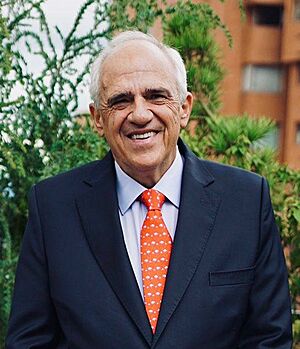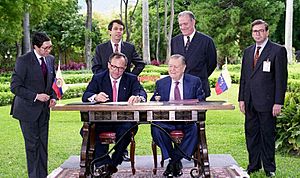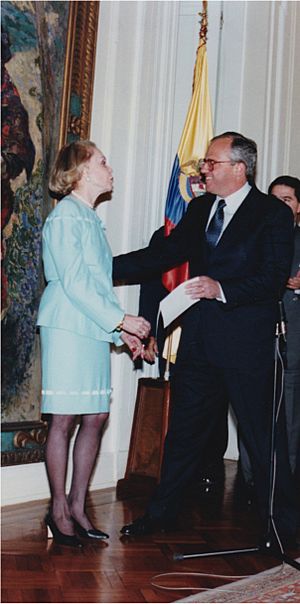Ernesto Samper facts for kids
Quick facts for kids
Ernesto Samper
|
|
|---|---|

Samper in 2023
|
|
| 30th President of Colombia | |
| In office 7 August 1994 – 7 August 1998 |
|
| Vice President |
|
| Preceded by | César Gaviria |
| Succeeded by | Andrés Pastrana |
| 4th Secretary General of the Union of South American Nations | |
| In office 1 August 2014 – 31 January 2017 |
|
| Preceded by | Alí Rodríguez Araque |
| Succeeded by | Vacant |
| 17th Secretary General of Non-Aligned Movement | |
| In office 18 October 1995 – 7 August 1998 |
|
| Preceded by | Suharto |
| Succeeded by | Andrés Pastrana |
| Colombia Ambassador to Spain | |
| In office 1991–1993 |
|
| President | César Gaviria |
| Preceded by | William Jaramillo |
| Succeeded by | María Emma Mejía |
| Minister of Economic Development | |
| In office 7 August 1990 – 28 October 1991 |
|
| President | César Gaviria |
| Preceded by | Position established |
| Succeeded by | Jorge Ospina Sardi |
| Senator of Colombia | |
| In office 20 July 1986 – 20 July 1990 |
|
| Personal details | |
| Born | 3 August 1950 Bogotá, Colombia |
| Political party | Liberal |
| Spouses |
Silvia Arbeláez
(m. 1972; div. 1975)Jacquin Strouss Lucena
(m. 1979) |
| Children |
|
| Alma mater |
|
| Profession | Economist |
Ernesto Samper Pizano was born on August 3, 1950. He is a Colombian lawyer, economist, and politician. He served as the President of Colombia from 1994 to 1998. Later, from 2014 to 2017, he was the Secretary General of the Union of South American Nations (UNASUR).
During his presidential campaign, there was an investigation into how his campaign was funded. This investigation was called the "8000 process." It looked into claims that money from a group involved in illegal activities was used to help his campaign. This was said to have happened because the election was very close. Colombia has two rounds of elections if no one wins a majority in the first round. The Colombian Chamber of Representatives later decided that Samper was not guilty.
Contents
Who is Ernesto Samper?
Ernesto Samper comes from a family with many notable people in Colombia. His family includes writers, politicians, and other important figures.
Samper's Family Tree
One of his great-great-grandfathers was Teodoro Valenzuela Sarmiento. He was related to a former president and hero of Colombia's independence. Another great-great-grandfather was the poet Diego Fallón Carrión. His great-great-grandmother, Felisa Pombo Rebolledo, was the sister of the famous poet Rafael Pombo.
Samper is also related to Antonio Nariño, a key figure in Colombian history. His paternal grandfather was the writer Daniel Samper Ortega. His direct grandfather was the businessman Tomas Samper Brush. His grandfather, Miguel Samper Agudelo, was a presidential candidate in 1898.
Ernesto Samper is the nephew of the well-known architect Germán Samper Gnecco. His brother, Daniel Samper Pizano, is a famous writer and journalist. He is also a cousin of the biologist Cristián Samper.
Early Life and Schooling
Ernesto Samper was born in Bogotá, Colombia, on August 3, 1950. His parents were Andrés Samper Gnecco and Helena Pizano Pardo. His brother, Daniel Samper Pizano, is a well-known writer. The Samper family has a long history of writers.
Education and Early Career
Samper attended the Gimnasio Moderno, a respected high school in Bogotá. He then went to the Pontifical Xavierian University. He earned a degree in economics in 1972 and a law degree in 1973. He also studied economics at Columbia University in New York City. In 1974, he became a professor of law and economics at his old university.
Starting His Political Journey
Ernesto Samper began his political career by helping with a presidential campaign in 1982. This campaign was for former president Alfonso López Michelsen, but it was not successful.
Becoming a Public Servant
After that, Samper became a member of the Bogotá City Council. This council helps manage the city. Later, he became a member of the Senate of Colombia. The Senate is a part of the country's main law-making body.
Presidential Campaigns
Samper ran for president several times. His campaigns were often very close races.
1990 Presidential Race
In 1990, Samper tried to become the Liberal Party's candidate for president. He was part of the party's reformist group, like the person who eventually won, César Gaviria. In 1989, Samper was seriously injured during an attack on a political leader. He had to be hospitalized with a serious illness. After this, his campaign focused strongly on security. He wore bullet-proof vests and had a large security team.
Serving as Minister and Ambassador
During César Gaviria's time as president, Samper held important roles. He was the Minister of Economic Development from 1990 to 1991. After that, he served as Colombia's ambassador to Spain from 1991 to 1993.
1994 Presidential Race
In 1993, the 1994 presidential election began to take shape. It was clear that the race would be very close. The main candidates were Samper and Andrés Pastrana from the Conservative Party. Opinion polls showed very different results.
The first round of elections happened on May 29, 1994. Ernesto Samper won with 45.2% of the votes. Pastrana came in second with 45%. Since no candidate won more than 50% of the votes, a second round was needed. This second round would be between Samper and Pastrana.
Because the first round was so close, Samper's campaign needed more money for the second round. They had spent all their funds trying to win in the first round. To get more support, the campaign received money from a group involved in illegal activities. These donations were given in large bags.
On June 19, 1994, after three more weeks of campaigning, Samper was elected president. He won by a small margin, with 50.37% of the votes compared to Pastrana's 48.64%. He officially became president in August.
President of Colombia

On August 7, 1994, Ernesto Samper was sworn in as president. The ceremony took place in Plaza Bolívar, Bogotá. Important people from other countries, like Cuban president Fidel Castro, were there. In his speech, Samper said that fighting illegal activities was a top priority. He also stated that no one should tell Colombia how to handle this issue.
Efforts Against Illegal Activities
In June 1995, Samper announced that his government had made good progress in fighting illegal activities. He said this fight had cost Colombia many lives over ten years. This included police officers, soldiers, judges, journalists, and even presidential candidates. His government launched a broad effort to target various aspects of these illegal groups. They focused on bank accounts, labs, crops, chemicals, transportation, and political connections.
In June 1995, a law against money laundering was signed. Also, Gilberto Rodriguez Orejuela, a leader of a group involved in illegal activities, was arrested. He was one of over 1,100 members arrested that year. By August, five more leaders were arrested. This left only one top leader still at large.
In the first half of 1995, a large amount of illegal crops were destroyed. This was much more than in 1994. Many gallons of liquid chemicals and kilograms of solid chemicals were also destroyed. A significant amount of illegal substances were seized, and many labs were shut down.
In 1995, Colombia's Caribbean islands became important bases. From these islands, the military could stop illegal shipments and communications. Police operations in the city of Cali also increased. These operations aimed to stop illegal activities there.
The police worked hard to find and arrest leaders of these groups. They searched many places like farms, houses, and offices. They found weapons, illegal substances, money, and important business documents. These documents helped them understand the groups' financial networks and their attempts to influence politicians. The police used tactics like raids and roadblocks to catch people. They also focused on shutting down private security groups and freezing bank accounts to stop the flow of money.
However, the demand for illegal substances continued to grow in other parts of the world. This meant that illegal activities would likely continue. Samper suggested that countries should work together more. This included sharing information, creating treaties to stop money laundering, controlling chemicals, and supporting farmers who grow legal crops. He also suggested a world meeting on these issues.
International Relations
After Samper's election, the US Senate approved a measure. This measure said that financial aid to Colombia would depend on the Colombian government's commitment to fighting illegal activities. Colombia's foreign minister, Noemí Sanín, responded by saying Colombia could fight these activities without the United States. She also said the measure was "disrespectful."
On March 1, 1996, US President Bill Clinton reduced most of the economic aid to Colombia. He said Colombia's government was too corrupt to fight illegal groups effectively. However, Colombia still received some aid specifically for fighting illegal activities. The United States also tried to block loans from international organizations. For years, the US criticized Samper's government for not doing enough to fight illegal activities. The US also canceled Samper's visa, which meant he could not enter the country.
Later Roles
After his presidency, Samper continued to be involved in public life.
Ambassador Offer
In July 2006, President Álvaro Uribe offered Samper the position of Colombia's ambassador to France. This offer caused some disagreement. Former President Andrés Pastrana, who was then the Ambassador to the United States, resigned because of it. The media and political groups also expressed their concerns. In the end, Samper decided not to accept the offer.
Secretary General of UNASUR
In July 2014, Samper was chosen as the Secretary General of the Union of South American Nations (UNASUR). He started this job on September 11, 2014. During his inauguration ceremony, Samper said he would focus on political, social, and economic goals for South America. He also planned to create a South American International Criminal Court. This court would handle criminal issues in the region. Samper finished his term on January 31, 2017.
Personal Life
Ernesto Samper was first married to Silvia Arbelaez. They had one son named Andrés. They later divorced. On June 16, 1979, Samper married Jacquin Strouss Lucena. They have two children together, Miguel and Felipe.
See also
 In Spanish: Ernesto Samper para niños
In Spanish: Ernesto Samper para niños


